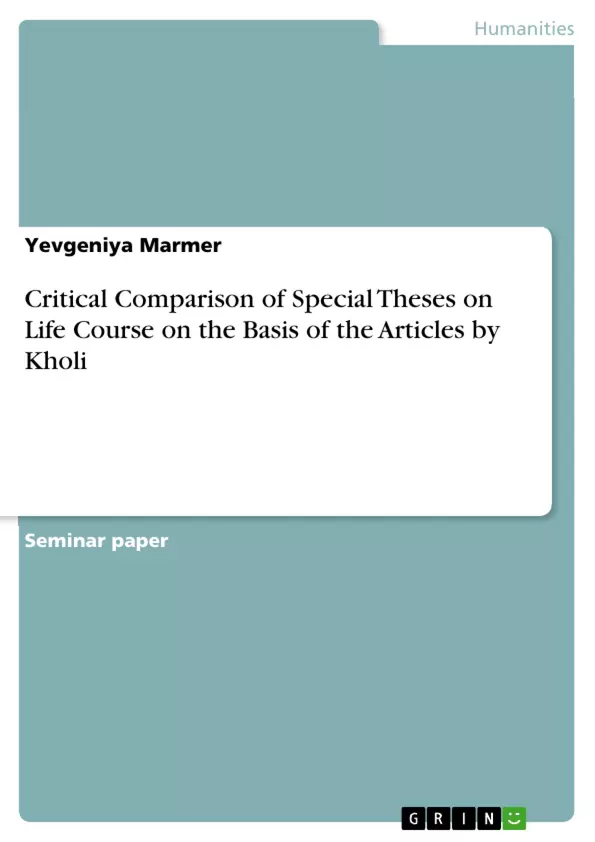For over 20 years now the concept of the institutionalized life course is being developed and now it became a broadly accepted and practiced theory amongst sociologists.
The development of the theoretical background for the life course research can be located already in the first half of the 20th century, with important studies of this period performed by Znaniecki, F and Thomas, W.I. (1918) who designed the model of the “Life Cycle” or “Life History” and the “Model of Generation” by Karl Mannheim (1928) . Erikson/Clausen followed in the 1940s with the theory of “Human Development” along with Eisenstadt/Parsons with their “Model of Age Differentiation” . Then, in the 1960s and 1970s the latter model was subdivided into the concept of “Age Stratification” by Riley, the concept of “Biography” by Bertaux, the concept of “Life Course” by Elder and the concept of “Cohort” by Ryder/Easterlin . In the 1980s the “Life Course” concept was developed into “The Tripartite Life Course in the Work Society” by Kohli and the “(Welfare) State” which is divided itself into “General” by Mayer/Müller and “Differentitation”. The differential life course means that life course patterns can be different, meaning that country-specific patterns of life courses are differentiated according to gender, social class and interaction.
This paper will try to provide a critical comparison of the special theses on the life course on the basis of the article “Institutialization of the Life Course: Looking back to look ahead” by Kholi (2007) and “Life Courses and Life Chances in a Comparative Perspective” by Mayer (2004).
Inhaltsverzeichnis (Table of Contents)
- Introduction
- “Institutionalization of the Life Course: Looking back to look ahead” by Martin Kohli (2007)
- "Life Courses and Life Chances in a Comparative Perspective" by Karl Ulrich Mayer (2004)
- Basic assumptions and main arguments
- Conclusion
- Bibliography
Zielsetzung und Themenschwerpunkte (Objectives and Key Themes)
This paper aims to provide a critical comparison of special theses on the life course based on the articles "Institutionalization of the Life Course: Looking back to look ahead" by Kohli (2007) and "Life Courses and Life Chances in a Comparative Perspective" by Mayer (2004). The paper analyzes the assumptions and arguments presented in both articles, identifying similarities and differences, and exploring how these arguments complement each other.
- The institutionalization of the life course
- Life course transitions and individualization
- The impact of social and economic structures on life course trajectories
- The role of welfare regimes in shaping life courses
- The increasing differentiation and heterogeneity of life courses across populations
Zusammenfassung der Kapitel (Chapter Summaries)
- Introduction: This chapter provides an overview of the development of the life course concept and its theoretical background, highlighting key contributions from prominent scholars like Znaniecki and Thomas, Mannheim, Erikson and Clausen, and others. It introduces the concept of the institutionalized life course and sets the stage for the comparative analysis of Kohli's and Mayer's theses.
- “Institutionalization of the Life Course: Looking back to look ahead” by Martin Kohli (2007): This chapter summarizes Kohli's thesis of the institutionalization of the life course. It examines the five propositions of the model, including temporalization, chronologization, individualization, tripartition of the life course, and dual dimensions. It also discusses the concept of life course security and predictability, and the tension between standardized life-course programs and the increasing demand for individualization.
- "Life Courses and Life Chances in a Comparative Perspective" by Karl Ulrich Mayer (2004): This chapter focuses on Mayer's perspective on life courses and life chances in a comparative context. It explores the impact of different welfare regimes on life course trajectories, including the "liberal market state", the "continental conservative welfare state", the "Scandinavian social democratic welfare state", and the "Southern European welfare state". It also examines the influence of globalization and supranational trends on life course patterns.
Schlüsselwörter (Keywords)
The main keywords and focus topics of this paper include the institutionalized life course, life course transitions, individualization, social and economic structures, welfare regimes, comparative perspectives, life chances, differentiation, and heterogeneity. The analysis focuses on the interplay between these concepts and their implications for understanding the diverse trajectories of individual and group life courses in contemporary societies.
Frequently Asked Questions
What does the "institutionalization of the life course" mean?
It refers to the sociological theory that individual lives are structured by social institutions, particularly the labor market and the state, into standardized patterns like education, work, and retirement.
What are Martin Kohli's five propositions regarding the life course?
Kohli identifies temporalization, chronologization, individualization, the tripartition of the life course (preparation, activity, retirement), and dual dimensions as key elements.
How do welfare regimes shape individual life courses?
Different welfare states (liberal, conservative, social democratic) provide varying levels of support and regulation, which influence transitions like entering the workforce or retiring.
What is the difference between Kohli's and Mayer's perspectives?
While Kohli focuses on the institutionalized structure and individualization, Mayer emphasizes life chances and the comparative impact of socio-economic structures and global trends.
Why is the "tripartite life course" significant?
It describes the modern division of life into three distinct phases: education (preparation), work (participation), and retirement (pension), primarily driven by the work society.
- Citation du texte
- Yevgeniya Marmer (Auteur), 2013, Critical Comparison of Special Theses on Life Course on the Basis of the Articles by Kholi, Munich, GRIN Verlag, https://www.grin.com/document/540940



